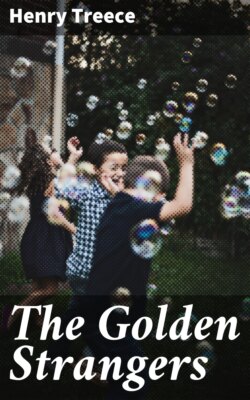Читать книгу The Golden Strangers - Henry Treece - Страница 3
На сайте Литреса книга снята с продажи.
Barley Dream
ОглавлениеTable of Contents
At last the ice withdrew over the edge of the world and now, wherever willow did not grow, the wide plains swarmed with creatures, reindeer and buffalo, so that the masked Hunters forgot the thin days when they had dug deep in the ground for frozen roots and grubs. Now they had but to cast a spear to eat meat for a week.
Then as darkness fled and sun smiled warmly on the land, the rains began to fall. Trees planted themselves wherever they could find a footing—birch and pine, oak and elm, hazel and indomitable alder.
So the hunting grounds became fewer, for the trees’ great army had occupied the land, and at last men looked towards the sea for food, forgetting the sweet taste of deer and giant ox, grateful gleaners of salt shellfish now.
At length, majestic, sea roared down the tree-hung valley, and one golden morning an island stood separate, new-born, afraid with loneliness. Those who came now must cross in boats, must dare death in the valley, among the blackened oaks.
This was the way the dark folk came, the little ones who brought the barley seeds.
The hungry hawk, poised high above the hills, at last looked down on a land that shaped itself into something it had not been before, an island that had made up its dark mind to live, in its fashion, to give home to men, to such men as were brave enough to help in the remaking of a world.
And this hawk saw the roads these men trod for themselves, white snail-tracks, high above the dusky woods, running the length of the land wherever ridges were; saw the great stones pointing, stark fingers to the sky, from hilltop to hilltop, guiding the dark ones down their spider’s webs; saw the brown villages, clustered hives, grabbed in a hedge of thorn, whose fires must never be allowed to die; saw the strange barley-fields, set round with lumps of chalk.
Kaleidoscopic eye swept over hilltop corral where the short-horned cattle lowed; swept down the slope to where a shepherd lad leaned with his back against an ancient tomb, dreaming of barley-cakes and honeyed milk, leaving his dogs to watch the thin-legged flock.
The hawk’s keen eye followed the flax-field down, down past the clustered bracken in the wood. There by a fallen oak a blind man lay, happy in sunlight, grunting to his herd.
The hawk’s red eye tasted the jostling swine, picked out the farrowing sow who struggled from the crowd into the sheltering patch of willow herb, swollen with time.
“Now! Now!” the buzzard’s cold heart urged.
“Now! Now!” called beak and talons back.
The hawk’s stone eye saw feast below it laid, red meat among the fern—and stooped to strike.
Then stone to stone, flint arrow-head struck deep, and plummet to the earth the buzzard fell, grey feathers scattered careless on the herd, among the squeaking new-born farrowlings.
Archer, smiling in his dark-eyed way, watched tired sow take up the staring hawk, watched those gold eyes ringed round with blood’s bright hue, stare fearless down the glistening dark maw.
So hawk was paid. He’d known the best, the worst.
The Archer watched the sow crunch up the bird. More hawk than swine, regretting the quick loss of that dear arrow-head, he walked up to the village, wondering.
The land was born. Yet with its birth had come another thing that made men fear the force that gave them life.
‘A payment must be made,’ they said, ‘for nothing comes of nothing.’
They said, ‘The bread we eat calls out for blood. Out of the belly of the earth it comes. Into that belly we must pour our blood if we would prosper. Nothing is given for nothing; barley asks for blood.’
So grew the Barley Dream, out of men’s fear; and so the Earth, as though anxious to please her new children, created signs for them to follow, granting their wayward hearts permission to shed blood in the furrows every year.
